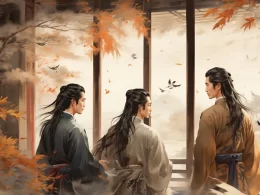From the wild temple, bells fade deep,
A cold lamp’s shadow grows more steep.
Thatched hall—an ancient Buddha sleeps,
Mountain path—autumn’s whisper creeps.
Pines hold the void in emerald hue,
Dawn’s first light stains the clouds anew.
My heart, serene, sheds worldly care—
Night’s stillness births moon’s silver glare.
Original Poem
「宿龙兴寺」
荒寺钟声远,寒灯影更清。
草堂眠古佛,山路宿秋声。
松色含空翠,云光入晓明。
心闲无俗虑,夜静月华生。
Interpretation
This poem was composed by Qiwu Qian during a night spent lodging at or passing by Longxing Temple. Using the temple's serene environment as a backdrop, the poet expresses his feelings of detachment from worldly clamor and inner tranquility. The temple's rustic antiquity, the quietude of nature, and the crisp chill of an autumn night collectively underscore the poet's peaceful and contented state of mind, reflecting his yearning for reclusive living and transcendence over mundane troubles.
First Couplet: "荒寺钟声远,寒灯影更清。"
Huāng sì zhōng shēng yuǎn, hán dēng yǐng gèng qīng.
From the desolate temple, distant bell tones ring,
Under the cold lamp's glow, shadows grow more defined.
The bell tones and lamplight conjure an atmosphere of secluded stillness, portraying the temple's ancient serenity and quietude.
Second Couplet: "草堂眠古佛,山路宿秋声。"
Cǎo táng mián gǔ fó, shān lù sù qiū shēng.
In the thatched hall sleeps an ancient Buddha,
Along the mountain path lingers autumn's nightly chorus.
This depicts the temple's rustic simplicity and natural surroundings, evoking the cool solitude of an autumn night and crafting an ethereal意境 (artistic conception).
Third Couplet: "松色含空翠,云光入晓明。"
Sōng sè hán kōng cuì, yún guāng rù xiǎo míng.
Pine hues embrace the sky's emerald clarity,
Cloud-lit dawn breaks through with luminous purity.
At daybreak, the verdant pines and morning light piercing the mountains present a scene of pristine freshness, symbolizing peace and far-reaching contemplation.
Fourth Couplet: "心闲无俗虑,夜静月华生。"
Xīn xián wú sú lǜ, yè jìng yuè huá shēng.
A carefree mind, from worldly thoughts released,
In night's deep hush, the moon's radiance is unveiled.
The poet's tranquil mind, unburdened by earthly concerns, merges with the serene beauty of the moonlit night, revealing his inner clarity and freedom.
Holistic Appreciation
Through delicate depictions of scenery, this poem creates a tranquil and profound atmosphere of an overnight stay in a mountain temple. The imagery is vivid—temple bells, a solitary lamp, an ancient Buddha, autumn sounds, pine hues, cloud-filtered light, and moonbeams intertwine to form a serene and otherworldly nightscape. The poet channels emotion through the landscape, expressing inner peace and purity. The line "a mind at ease, untouched by worldly cares" encapsulates the poem’s essence, reflecting the poet’s yearning to transcend mundane concerns and preserve his true nature. With concise language and deep artistic conception, this work is a quintessential example of Cui Dong’s reclusive poetic style.
Artistic Merits
The poem’s language is distilled and unadorned, adept at conveying emotion through stillness and emphasizing an atmosphere of quietude. Images like "the distant chime of a desolate temple," "a cold lamp," "an ancient Buddha," and "autumn whispers" immerse the reader in the depths of an ancient monastery, evoking harmony between nature and the soul. Blending movement and stillness, scene and sentiment, the poem carries a strong Zen-like quality and an air of detachment, revealing the poet’s grasp of Buddhist wisdom and his devotion to reclusive living.
Insights
This poem reminds us that in a chaotic world, maintaining a mind free from worldly stains is essential. Only with stillness like water can one perceive life’s purest beauty and tranquility. Through his portrayal of the temple’s nightscape, Cui Dong inspires us to seek inner calm and transcendence amid busy lives, urging us to cultivate self-adjustment and cherish the clarity and freedom of the spirit.
About the Poet
Qiwu Qian (綦毋潜, 692 - 755) was a Tang dynasty poet from Qianzhou (present-day Ganzhou, Jiangxi Province). He earned the prestigious jinshi degree in 726 during the Kaiyuan era and held official positions including Right Reminder and Court Archivist. Celebrated for his landscape and pastoral poetry, Qiwu developed a refined style characterized by serene subtlety. His literary circle included Wang Wei and Meng Haoran, with whom he exchanged poetic works, establishing himself as a key figure of the High Tang landscape poetry tradition.











